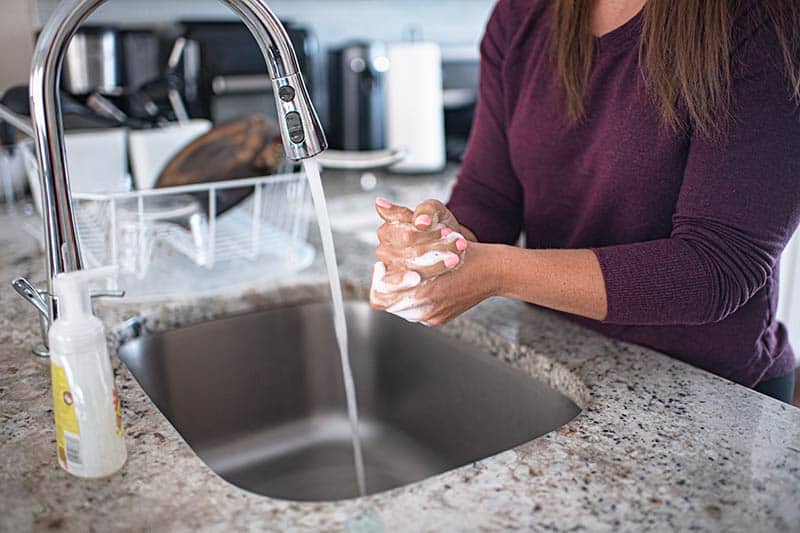Hard vs. Soft Water: Understanding the Impact on Your Home and Health

Water – it’s essential for life and a fundamental resource we interact with daily. Yet, not all water is created equal. The distinction between hard vs. soft water is more significant than most homeowners realize, affecting everything from the lifespan of your appliances to the feel of your skin after a shower.
Understanding the difference between hard vs. soft water isn’t just about scientific curiosity—it’s about practical knowledge that can save you money, extend the life of your appliances, and improve your daily living experience. Quality Plumbing is here to help you explore how to identify your water type, the impacts of hard water on your home, the benefits of soft water, and solutions to address water hardness issues.
[Related: Why is My Water Bill So High? Understanding and Addressing Unexpected Increases]
Identifying Hard vs. Soft Water
Before addressing any water quality issues, you need to know what you’re dealing with. Let’s explore the telltale signs that can help you determine whether you have hard or soft water in your home.
Signs of Hard Water
Hard water leaves its calling card throughout your home in various ways:
- Visible Evidence: One of the most obvious signs is white, chalky residue on fixtures, faucets, and appliances. This scale buildup, composed primarily of calcium carbonate, accumulates over time and can be difficult to remove with regular cleaning.
- Kitchen Frustrations: If you notice spots on dishes and glassware after washing, even when using a dishwasher, hard water is likely the culprit. These spots are mineral deposits left behind as water evaporates.
- Bathroom Battles: Hard water makes soap less effective, resulting in reduced lathering and cleaning power. You might find yourself using more soap, shampoo, and detergent to achieve the same cleaning results. After showering, you may experience dry, itchy skin and dull, lifeless hair—another common sign of hard water.
- Laundry Issues: Clothes washed in hard water often feel stiff and scratchy, even with fabric softener. Colors may fade faster, and whites might take on a grayish tinge over time.
- Plumbing Problems: Perhaps most concerning is the scale buildup that occurs inside pipes and appliances. This buildup restricts water flow, reduces efficiency, and can lead to premature failure of water heaters, dishwashers, and washing machines.
Signs of Soft Water
In contrast, soft water provides a noticeably different experience:
- Spotless Results: Dishes and glassware come out clean and spot-free after washing, with minimal residue.
- Effective Cleaning: Soap lathers easily and rinses completely, requiring less product to achieve desired results. This applies to personal care products, dish soap, and laundry detergent.
- Laundry Benefits: Clothes washed in soft water feel softer and maintain their color and texture longer. You’ll likely use less detergent and may be able to skip fabric softener altogether.
- Plumbing Protection: Soft water causes minimal scale buildup in plumbing, helping maintain water pressure and flow throughout your home.
- Personal Care Perks: After bathing in soft water, your skin and hair typically feel smoother and more moisturized, without the residue often left by hard water.
Understanding these signs can help you identify your water type without specialized testing, though professional water quality testing provides the most accurate assessment of water hardness levels. Call Quality Plumbing today for expert solutions when hard water affects your plumbing system.
Impact of Hard Water on Your Home

Hard water’s effects extend throughout your entire home, creating a cascade of problems that impact both your property and finances. In your plumbing system, mineral buildup gradually reduces water flow, decreases pressure, and forces your system to work harder—leading to increased energy costs, potential pipe blockages, and premature failures requiring costly repairs.
Water-using appliances suffer similarly, with scale accumulation reducing efficiency and shortening lifespans; water heaters may fail 25-40% sooner, dishwashers produce spotty results despite quality detergents, and washing machines deliver less clean clothes while requiring more frequent maintenance.
Beyond these technical impacts, hard water significantly affects daily living by requiring up to 50% more cleaning products, creating stubborn mineral deposits on fixtures and surfaces, and even affecting personal care—leaving skin dry and itchy and hair dull and difficult to manage. The cumulative financial impact becomes substantial when considering premature appliance replacements, increased energy consumption, higher product usage, and the additional time spent battling persistent mineral deposits throughout your home.
[Related: Common Problems in Plumbing]
Benefits of Soft Water
Soft water delivers significant financial advantages by extending appliance lifespans by 30-50%, reducing energy consumption (up to 29% for water heaters), cutting soap and cleaning product usage by half, and minimizing plumbing repairs. These savings quickly offset the initial investment in water treatment solutions while providing a more comfortable living environment.
The practical benefits of soft water enhance daily life in numerous ways:
- Spotless, sparkling dishes and glassware without residue
- Softer, brighter laundry with less detergent required
- Reduced cleaning time as surfaces stay cleaner longer
- Less soap scum in bathrooms and kitchens
- Smoother skin and silkier hair after bathing
- Reduced irritation for those with sensitive skin
- More effective personal care products
- Better-tasting drinking water (subjective)
These combined advantages make soft water a worthwhile consideration for homeowners seeking to protect their investments, reduce maintenance requirements, and improve their overall quality of life.
Hard vs. Soft Water: Water Softening Solutions

Now that we understand the impact of hard vs. soft water, let’s explore the various solutions available to address water hardness issues. Whole-house treatments include traditional ion exchange softeners that replace minerals with sodium, salt-free conditioners that prevent scale formation, magnetic/electronic descalers that alter mineral properties, and reverse osmosis systems that remove multiple contaminants.
For specific applications or rental situations, point-of-use options like shower filters, faucet attachments, and portable softeners provide more limited but focused benefits.
A professional assessment is crucial for optimal results, including accurate water hardness testing, proper system sizing based on household needs, expert installation, and regular maintenance. At Quality Plumbing, our experienced technicians can evaluate your specific water quality challenges and recommend the most appropriate and cost-effective solution for your home, ensuring you receive the full benefits of soft water throughout your property.
Contact Quality Plumbing for Expert Plumbing Solutions
Hard vs soft water impacts everything from appliance longevity to skin comfort. Understanding your water quality helps you choose the proper treatment solution for significant long-term benefits. At Quality Plumbing, our plumbing experts approach every job with the care and attention we give to our own family and friends and are available 24/7—treating your home like our own. Contact us today for expert plumbing solutions.

